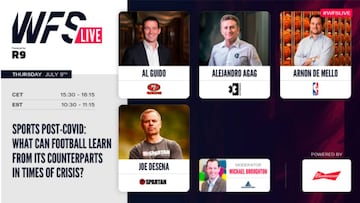The future of sports and football with Covid-19
Top executives from sports other than football discussed how best the beautiful game can learn from its counterparts during and after the coronavirus pandemic.


The World Football Summit, being held online all this week due to the coronavirus pandemic, held a round table this afternoon, Thursday, to discuss the threats and opportunities caused by Covid-19 for sports, with the guests all top executives from sports other than football, who could offer insights and lessons from their own areas, which could be applied to football itself.
The round table was hosted by Michael Broughton, an adviser at Acceleration Equity who previously worked with FIFA using technology to grow the game. He was joined by Alejandro Agag, the CEO of Extreme E, who created Formula E and was a previous owner of QPR, Al Guido, the president of the San Franisco 49ers and chairman of Elevate Sports Ventures, Arnon de Mello, VP and Managing Director for NBA Latin America, and Joe de Sena, CEO and founder of Spartan Race.
Covid-19 has hit all businesses hard
Al Guido got things underway by pointing out the reality of the coronavirus pandemic and just how hard it has hit almost every business, including sport. “While sport has historically been resilient, this is a new challenge that we’ve never seen before. No business can survive with no revenue in and costs continuing to go out.”
Michael Broughton asked him how the fact that there could be no fans at stadiums would affect the 49ers, where the concept of the ‘game day’ is so important. Guido explained that while that is true, the reality is, “we produce content for our over 10 million fans who are never going to step inside Levi’s Stadium, and we do that every day. So basically we have to try and change a lot of the things we do. People love our sport all over the globe, so for us it’s all about getting our content into their hands in an efficient manner.”
In his opinion, in many respects Covid-19 is only going to accelerate changes that were already happening. “Many of these things were customer service issues, and now they are customer safety issues too. So technology like mobile tickets and contactless cashless.”
Importance of technology - and attitude - in a Covid-19 world
The use of technology and how fans interact with sports properties will be a key part of the post-pandemic landscape. Al Guido: “It's incumbent upon all of us to find new ways to to get revenue onto the books. Things we might have thought we couldn’t do, we need to start thinking about our ability to do those things - whether that’s new sponsorship assets inside television broadcasts, or new distribution platforms, or membership ideas, like what I saw happened with Barça TV.”
For Alejandro Agag, attitude at this moment in time is key. “You can always say this is the biggest disaster ever, but that doesn’t help anyone. There are always things you can do it turn things around.” He noted that in motorsports one of the perennial problems is stopping teams from going bankrupt by spending too much money, “saving them from themselves”. And noted that with the coronavirus it has been easier to put in place cost controls. “You have to take [the pandemic] as an opportunity.”
Joe de Sena explained how he had to furlough 75% of the staff at his company Spartan Race, but was desperate to keep in touch with the participants, to keep the feeling of community, having had 325 events planned across 45 counties that they couldn’t put on.
Spartan Race has now managed to restart and is holding events, with the first being in Florida. “30% of people are just afraid and they’re not going to come out, but 70% of people embrace it. I didn’t know if the people who showed up would break the [coronavirus] safety rules, but by and large everybody followed them.”
“Normally we get 8,000 or 9,000 people at an event, and at this we had a couple of thousand. But I can’t tell you how many hundred people came around a corner and saw me and just started crying, because they got a chance to live again. I think I think all the virtual things and initiatives we're talking about are great and a requirement. But I think humans need interaction, even if it’s from six feet away. People had been locked up in their homes for so long and now they just felt alive again.”
Content is king
How content covering sports will be created and distributed is vital to the post-Covid-19 sports world, although, again, all the panelists were in agreement that in general what the coronavirus has done is accelerate trends that were already occurring.
Al Guido said, “the power of the athlete’s, the power of the platform, has never been bigger. We’ve seen athlete’s really using their brands on our platforms, on their social media. And we have 20 people in the 49ers studio capturing content every day, but we also have 10 million fans capturing content. Think of someone recording in the stadium on their phone when it erupts. And someone sitting at home and is thinking, I missed out on that. I could have been there.”
Overall, according to Guido, the fans want to know about the athletes, what they do when they get in the car, when they’re at home, what their passions are, so it’s important to the teams to help the athletes maximise their platforms and increase fan engagement.
Sport will be even more global post-Covid-19
With sport already globalising prior to the pandemic, Arnon de Mello was keen to stress that the pandemic is only going to accelerate this trend. “At the NBA we have 13 office around the world and technology will continue to enhance our position in those markets where we don’t have the game being physically played.”
The restart is allowing the NBA to experiment, with their camp in Orlando, “We have time slots for games to be played in the US in the early afternoon, so for the first time we’ll have games live in prime time in Europe and Africa. So that’s another step for us to test and continue to be more of a global brand.”
Another way technology is working for NBA is to have new camera angles, and also new ways to interact with the game and to listen to the game. “Usually we had one or two options to watch and listen, and now you can hear from YouTubers, influencers, experts, all calling the game, so there are more options for fans.”
In the face of the coronavirus: optimism
Related stories
Overall the vision of the panellists is one of optimism, despite the huge problems caused to sports across the board. "Necessity is the mother of invention", said Guido, "and we're seeing athletes and coaches doing things they wouldn't have done before, because they realise we are in the most challenging time in our world from a business and sports and economics perspective right now.
"This has hit every single one of us. And so, that necessity to find new ways to engage with fans, not just to get our sports back, because obviously that's tough enough as it is right now on the medical side... but to find new levels of engagement and to find new revenue streams. This in and of itself is forcing us to do that, we have no other choice but to think outside the box right now, and I view that as like a tremendous opportunity for the sports entertainment world."